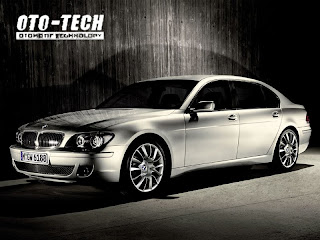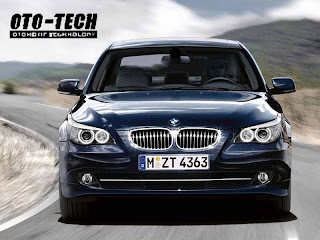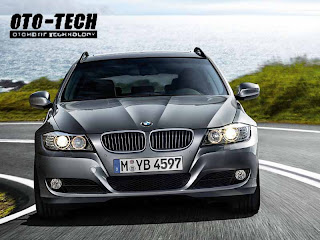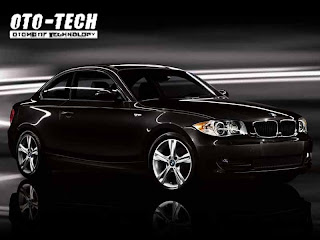 The BMW 7-Series is one of the top performers in a class made up of the world's finest cars. Its V8 is a touch smaller than those offered by some competitors, but with twin turbochargers and direct-injection, it can outperform many larger engines. Its handling is unparalleled in the large car class. And its Driving Dynamics Control system allows the driver to choose levels of performance - Comfort, Normal, Sport and Sport Plus - each with its own suspension and steering settings.
The BMW 7-Series is one of the top performers in a class made up of the world's finest cars. Its V8 is a touch smaller than those offered by some competitors, but with twin turbochargers and direct-injection, it can outperform many larger engines. Its handling is unparalleled in the large car class. And its Driving Dynamics Control system allows the driver to choose levels of performance - Comfort, Normal, Sport and Sport Plus - each with its own suspension and steering settings.
 the BMW 6-Series' powerful 4.8-liter V8 engine. It produces 360-horsepower at 6,300 rpm and 360 pound-feet of torque at 3,400 rpm. Though a six-speed manual transmission with Dynamic Driving Control is standard, a sport automatic transmission with shift paddles is available at no additional cost. According to BMW, both the 650i Coupe and Convertible have a top speed of 150 mph. However, the Coupe's ability to accelerate from 0 to 60 mph in only 5.3 seconds trumps the Convertible by 0.3 seconds.
the BMW 6-Series' powerful 4.8-liter V8 engine. It produces 360-horsepower at 6,300 rpm and 360 pound-feet of torque at 3,400 rpm. Though a six-speed manual transmission with Dynamic Driving Control is standard, a sport automatic transmission with shift paddles is available at no additional cost. According to BMW, both the 650i Coupe and Convertible have a top speed of 150 mph. However, the Coupe's ability to accelerate from 0 to 60 mph in only 5.3 seconds trumps the Convertible by 0.3 seconds.
The EPA reports a city/highway fuel economy of 15/22 mpg with the manual 650i Coupe and 14/21 mpg with the manual 650i Convertible. Both automatic models net 15/13 mpg.
 The 2011 BMW 5-Series is offered with a choice of two engines, both entirely new designs. The 535i uses a 3.0-liter inline six-cylinder engine with a single turbocharger (it’s easy to get confused here, because BMW calls it a “twinpower turbo,” but it’s just one turbocharger). It puts out 300 horsepower. Reviewers are very impressed with that engine, though a vocal minority says it isn’t as responsive as most BMW powerplants.
The 2011 BMW 5-Series is offered with a choice of two engines, both entirely new designs. The 535i uses a 3.0-liter inline six-cylinder engine with a single turbocharger (it’s easy to get confused here, because BMW calls it a “twinpower turbo,” but it’s just one turbocharger). It puts out 300 horsepower. Reviewers are very impressed with that engine, though a vocal minority says it isn’t as responsive as most BMW powerplants.
The 550i uses a 4.4-liter, turbocharged V8, making 400 horsepower. Many note that it is more powerful and more fuel-efficient than the V8 offered in last year’s 5-Series, but few reviewers have driven this version.
Both engines come mated to either a six-speed manual transmission (the last stick-shift offered in the Luxury Large Car class), or an eight-speed automatic. Reviewers are fond of the automatic, saying it tends to hunt for gears much less than most seven- or eight-speed transmissions. An optional Steptronic sport package adds paddle shifters to the automatic. BMW loyalists should note that the 2011 5-Series uses conventional paddle shifters -- upshift with the right paddle, downshift with the left -- instead of the unusual thumb shifters found on other BMW products.
The EPA has not yet released fuel economy estimates for the 2011 5-Series. BMW estimates that 550i models should get 15/22 mpg with the manual transmission, or 17/25 mpg with the automatic. The company has not published a mileage estimate for the 535i.
 THE NEW BMW-3 SERIES WAGON 2010 Both the BMW 328i and 328i xDrive feature a 3.0-liter I6 engine that test drivers find is smooth and adequate. It generates 230-horsepower at 6,500 rpm and 200 pound-feet of torque at 2,750 rpm. Though a six-speed manual transmission is standard, a STEPTRONIC automatic is optional.
THE NEW BMW-3 SERIES WAGON 2010 Both the BMW 328i and 328i xDrive feature a 3.0-liter I6 engine that test drivers find is smooth and adequate. It generates 230-horsepower at 6,500 rpm and 200 pound-feet of torque at 2,750 rpm. Though a six-speed manual transmission is standard, a STEPTRONIC automatic is optional.
According to the EPA, the 3-Series wagon's city/highway fuel economy ranges from 17/25 mpg to 18/27 mpg, depending on trim and transmission.
Test drivers, on balance, agree that the BMW 3-Series wagon shines most brightly in the category of handling -- especially the 328i xDrive, which features a standard all-wheel drive system that enhances stability in adverse driving conditions.
 THE NEW BMW-3 SERIES 2010 Buyers who gravitate toward BMWs instead of Acuras or Lexuses are usually interested in performance. Today's rear-wheel-drive 3-series won't let them down. It offers three powerful engines, and a chassis and suspension tuned for aggressive handling. While some rivals have caught up to the 3-series in terms of driving excitement, none have passed it. But buyers should be aware that performance comes with a price. BMW has done a good job building a car that's comfortable for a sport sedan, but this is still a sporty sedan, jumpier than the sedate cruisers Lexus and Acura build at this price point.
THE NEW BMW-3 SERIES 2010 Buyers who gravitate toward BMWs instead of Acuras or Lexuses are usually interested in performance. Today's rear-wheel-drive 3-series won't let them down. It offers three powerful engines, and a chassis and suspension tuned for aggressive handling. While some rivals have caught up to the 3-series in terms of driving excitement, none have passed it. But buyers should be aware that performance comes with a price. BMW has done a good job building a car that's comfortable for a sport sedan, but this is still a sporty sedan, jumpier than the sedate cruisers Lexus and Acura build at this price point.
The 3-Series is available with three engines, and each is exceptional in its own way. BMW avoids the V6 engines that so many manufacturers depend on, instead using a 3.0-liter inline-6-cylinder engine on 328 models. That engine produces 230 horsepower and 200 pound-feet of torque, and depending on which other performance options are selected, earns an EPA rating of 17/15 or 18/28 mpg. 335 models get the same engine with a pair of turbochargers added, which boosts both hp and torque ratings to 300. That engine is rated for 17/26 mpg. A twin-turbo diesel option hasn't sold well since its introduction in mid 2009, but it may be the most impressive of the bunch. It makes a white-knuckle, pulse-pounding 425 lb-ft of torque, while carrying an EPA rating of 23/33 mpg. The standard 3-Series has a six-speed manual transmission, but an automatic, with or without paddle shifters, is available for any trim.
 THE NEW BMW-1 SERIES 2010 Performance is where the 2010 BMW 1-Series excels. Reviewers say the 1-Series is a brilliant performer, with plenty of engine power, a smooth-as-silk transmission, precise cornering and confident braking. Nonetheless, for all of this impressive performance, the 1-Series falls well short of its mark when it comes to fuel economy.
THE NEW BMW-1 SERIES 2010 Performance is where the 2010 BMW 1-Series excels. Reviewers say the 1-Series is a brilliant performer, with plenty of engine power, a smooth-as-silk transmission, precise cornering and confident braking. Nonetheless, for all of this impressive performance, the 1-Series falls well short of its mark when it comes to fuel economy.
Auto experts report that both the 128i and 135i 1-Series have enough power to outpace most of their class. However, that power comes at the expense of good gas mileage.
All 1-Series models come with the same 3.0-liter six-cylinder engine that you'll find in the 3-series. That said, while the 128i spits out an impressive 230 horsepower, the 135i is packing a full 300 horses, which help it to rocket from 0 to 60 miles an hour in 5.1 seconds. A six-speed manual transmission comes standard on all models, although a six-speed automatic is available for an additional $1,325.
The EPA has not yet rated the new 2010 1-Series, but it rated the 2009 model at an average of 18 mpg in the city and 28 mpg on the highway - a highly unimpressive rating for the class. Although some models fare better than others, the 135i coupe with the manual transmission gets the worst rating of 17/25 mpg city/highway -- which is low for the class. If fuel economy is important to you, check out the Volkswagen GTI. It has the highest fuel economy of any car in its class (21/31 mpg city/highway), boasts performance that's on par with the 1-Series and a starting price of about $6,000 less than the BMW.






